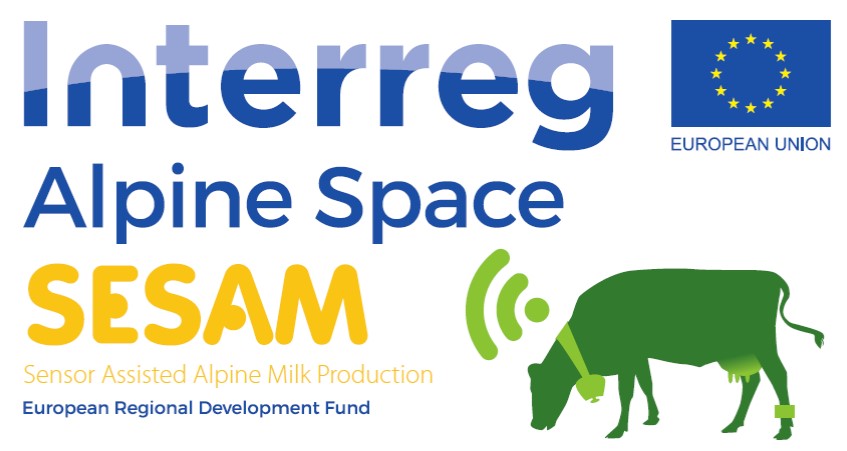
Overview
Alpine dairy farms often operate as family businesses and work mostly in regional economic cycles. These farms not only face competition by agro-industrial structures but also lack access to appropriate framework conditions: cost efficient, accessible IT-solutions that meet up-to-date monitoring standards. SESAM enabled small farms to boost competiveness and to realise an innovative, integrated monitoring that improve animal wellbeing, health, product quality and less workload for family farms. SESAM supported farms in implementing innovative and green standards (regional cycles, animal wellbeing) while anchoring these innovative management routines in the professional quality control mechanisms.
Factsheet
- 2014 – 2020
- Innovative
- Improve the framework conditions for innovation in the Alpine space
-
- Group 2: To increase the economic potential of strategic sectors
- 04/2018
- 10/2021
- 2.291.925 EUR
- 1.906.486 EUR
Partners
- Lead partner
- Germany
- Stuttgart
- Stuttgart
- Jürgen Bieger
- JBieger@lkvbw.de
- France
- Alsace
- Schiltigheim
- Germany
- Oberbayern
- München
- Austria
- Wien
- Wien
- Germany
- Freiburg
- Villingen-Schwenningen
- Slovenia
- Zahodna Slovenia
- Ljubljana
- Italy
- Provincia Autonoma di Bolzano/Bozen
- Bozen
- Slovenia
- Zahodna Slovenia
- Ljubljana
- Switzerland
- ZentralSwitzerland
- Zug
- 48.79001389.1997287
- 48.60471487.7484488
- 48.143041511.5059088
- 48.240988316.3751567
- 48.06323598.4945022
- 46.04898975000000414.503956692895823
- 46.470745911.3297392
- 46.070194614.4877663
- 47.16798988.5173652
Outcomes
-
Scoping report & Documentation of special needs and requirements of small alpine farms
StrategyScoping report & Documentation of special needs and requirements of small alpine farmsCAA - Regular assessment report for all Alpine countries Alsace is a region in the east of France that borders Germany and Switzerland. The Alsatian climate is semi-continental, marked by cold, dry winters and hot, stormy summers. The average annual temperature is 10°C in the plains and 7°C at altitude. The annual thermal amplitude is high (30°C). Like the average temperatures, the typology of the farms differs very strongly according to the geographical area. There is a very wide variety of farm types depending on the lowland farms and other locations. VSTZ (South Tyrol) - Regular assessment report for all Alpine countries South Tyrol is an autonomous province in northern Italy, one of the two that make up the autonomous region of Trentino-Alto Adige/Südtirol. The province is the northernmost of Italy with an area of 7,400 square kilometers. Its capital and largest city is Bolzano. The landscape itself is mostly cultivated with different types of shrubs and forests and is highly mountainous. Entirely located in the Alps, the province's landscape is dominated by mountains. LKV BY - Regular assessment report for all Alpine countries Dairy production is economically the most important agricultural sector in Bavaria, with about 25 % of the agricultural out value being generated by dairy production. Agricultural area in Bavaria is about 3.2 m ha, of which about 34 % is permanent grassland. The number of farms under milk performance recording has been steadily decreasing in the past decades, and is now less than half compared to 1990. At the same time, the number of cows stayed almost constant. CAFS - Regular assessment report for all Alpine countries Slovenia has a mostly mountainous terrain with a mainly continental climate, with the exception of the Slovene Littoral, which has a sub-Mediterranean climate, and of the Julian Alps in the northwest, which have an Alpine climate. Additionally, the Dinaric Alps and the Pannonian Plain meet on the territory of Slovenia. The country, marked by a significant biological diversity, is one of the most water-rich in Europe, with a dense river network, a rich aquifer system, and significant karst underground watercourses. Over half of the territory is covered by forest the human settlement of Slovenia is dispersed and uneven. -
Set up of General workplan and material for transnational training, awareness and educational workplan
StrategyA work plan for the implementation of the national and international trainings was drawn up in several meetings. The material for the events in the various countries has been prepared.The training courses were planned as face-to-face events. Due to the Covid-19 situation, the meetings were difficult to plan and it was decided at short notice to hold the meetings and trainings online. -
Cooperating with EUSALP AG2
StrategyAG2 of the EUSALP calls for action to "increase the economic potential of strategic secotrs".Although the current roadmap of AG2 focuses on Bioeconomy and Health and several thematic overlaps can be identified with SESAM, the AG expressed interest to cooperate also on a more strategic and long-term perspective as SESAM does also open the perspective to further thematically focus on the Action Group. SESAM started with the intention to establish an affiliation with the EUSALP Action Group 2 (Economic development). Now, a cooperation with other Actions Groups, especially Action Group 5 (Connectivity) shows a stronger topical overlap. This is due to the thematic foci of the action groups. While the contacts and the strategy with Action Group 2 had already been identified in the application process, the SESAM team is now busy intensifying contacts to Action Group 5 (see final report). -
Report: IT/sensor-based, easy-to-use framework for decision-making and advisory support for small dairy farms in Alpine space region
Strategy

